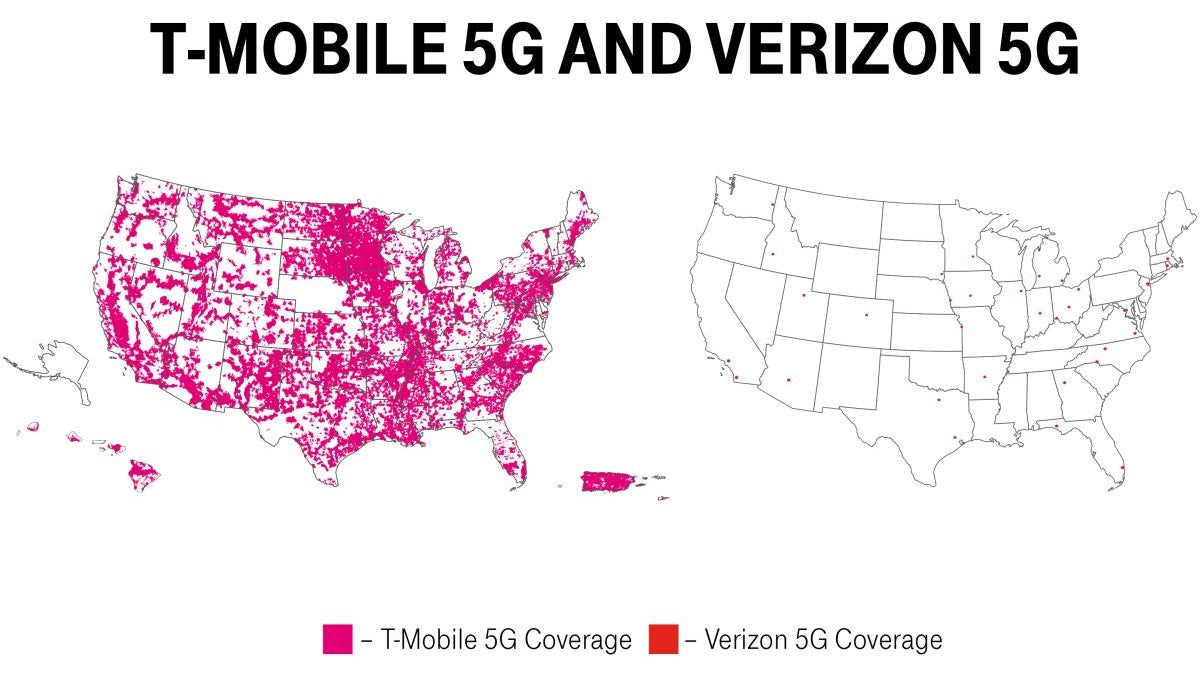Choosing between T-Mobile and Verizon, two of the largest wireless carriers in the US, is a common dilemma for consumers seeking the best mobile experience. Both offer powerful networks, unlimited data plans, and the latest smartphones. But asking “is tmobile better than verizon?” requires looking closely at what each carrier excels at and how that aligns with your personal needs. There isn’t one definitive answer, as the “better” choice varies based on factors like location, budget, data usage habits, and desired perks.
Network Coverage: 5G Reach vs. Overall Reliability
While both operate extensive nationwide networks, they have different coverage strengths:
- T-Mobile’s Edge: 5G Availability: T-Mobile has established the largest 5G network footprint in the United States. Thanks to its early and aggressive deployment of crucial mid-band spectrum (“Ultra Capacity 5G”), T-Mobile customers are more likely to have access to 5G service (both standard and high-speed) in more places across the country compared to Verizon, according to most independent network reports.
- Verizon’s Edge: 4G LTE & Reliability Reputation: Verizon is renowned for its vast and highly reliable 4G LTE network, which historically offered superior coverage, particularly in many rural areas. While its high-speed “5G Ultra Wideband” network provides exceptional performance where available, its overall 5G geographic reach is currently smaller than T-Mobile’s. Verizon often scores highly in overall network reliability metrics.
Verdict: If having the broadest access to any type of 5G signal is most important, T-Mobile leads. If overall network reliability, especially strong 4G LTE coverage, is your priority, Verizon remains a top contender. Always check the official coverage maps for your specific locations.

Network Speed & Performance: Average Speed vs. Peak Potential
Speed test results often show a contrast:
- T-Mobile: Fastest Average Speeds: Independent testing firms like Ookla and Opensignal consistently report T-Mobile having the fastest average 5G and overall download speeds nationwide, often significantly higher than competitors. They also rank well for network consistency.
- Verizon: High Peak Speeds & Reliability Metrics: While T-Mobile leads in averages, Verizon’s 5G Ultra Wideband network can deliver exceptionally high peak download speeds in areas where it’s deployed (using mmWave and C-Band). Verizon also frequently wins awards for network reliability and specific 5G experiences like gaming in various reports.
Verdict: T-Mobile generally provides faster average speeds for more people. Verizon offers potentially higher peak speeds via 5G Ultra Wideband where available and maintains a strong reputation for network reliability.
Read more about: verizon call history
Plans & Pricing: Bundled Perks vs. Add-On Flexibility
Both carriers offer tiered unlimited plans, but their pricing philosophy and included features differ:
- T-Mobile: Often slightly more affordable on comparable tiers, especially since taxes and fees are frequently included in the advertised price of their main Go5G plans. Higher-tier plans typically bundle perks like Netflix, Apple TV+, in-flight Wi-Fi, and significant international data/texting benefits.
- Verizon: Plan prices are competitive but taxes and fees are usually extra. Verizon utilizes its “myPlan” structure, where base plans (Unlimited Welcome, Plus, Ultimate) have fewer built-in perks, but customers can add optional perks (like the Disney Bundle, Apple Music, extra hotspot) for a flat monthly fee (e.g., $10-$15 per perk). This offers flexibility but can increase the total cost. Verizon’s premium plans tend to offer larger high-speed mobile hotspot allowances.
Verdict: T-Mobile often offers better perceived value due to included taxes/fees and bundled perks. Verizon provides greater flexibility for customers who want to pick specific add-ons.
Prepaid Options
Both offer no-contract prepaid plans with various data options, usually starting around $35-$50 per month for unlimited or near-unlimited data (with Auto Pay). MVNOs operating on their networks (like Visible for Verizon, Mint Mobile for T-Mobile) often provide even more budget-friendly alternatives.
Customer Service
Customer satisfaction surveys yield varying results:
- T-Mobile: Often leads among the major carriers in recent overall customer satisfaction studies.
- Verizon: Frequently scores very high in network quality and reliability rankings based on technical performance (e.g., fewest dropped calls).
Verdict: T-Mobile currently tends to edge out Verizon in general customer satisfaction surveys, while Verizon often leads in network performance metrics.
Conclusion: Is T-Mobile Better Than Verizon?
The question of “is tmobile better than verizon?” depends entirely on your priorities:
- Choose T-Mobile if: You prioritize the widest 5G coverage availability, the fastest average network speeds, plans with taxes and fees often included, and value bundled perks like streaming services and international benefits.
- Choose Verizon if: Your top priority is overall network reliability and consistent coverage (especially strong 4G LTE), you need service in specific rural areas where Verizon has traditionally excelled, you want access to potentially the highest peak 5G speeds (in 5G UW zones), or you prefer the flexibility of adding specific perks à la carte via the myPlan system.
Both carriers offer premium service. Evaluate your specific needs, check coverage maps meticulously for your area, and compare the current plan details and costs on their respective websites to determine which provider is truly “better” for you.